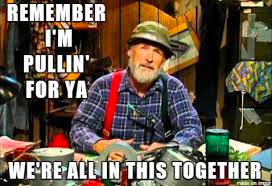Anxiety and stress are not the same thing.
Stress is a physiological experience in the face of a change in the internal or external system. It has its plusses and minuses. A little bit of stress over something you can do something about [I need to make that doctor's appointment] provides motivation to get it done and satisfaction (a nice hit of dopamine) once you do it.
On the other hand, chronic stress that cannot be resolved [I never knew when he would explode] exhausts every resource the body has to maintain homeostasis/balance. And that's not good.
Anxiety describes the negative thoughts and feelings that accompany stress.
It's not the only feeling that could accompany stress. When faced with changes like a new job, a challenging ski slope, or a date with the person of your dreams, you might also feel excitement.
Or maybe not. "Good" change and "bad" change are labels we apply from our own perspective. As far as the body goes, they don't really figure in. The physiological response is the same.
Consider a winding mountain road in a snowstorm. Some people default to excitement. [That would be Colorado-raised me.] Some people default to anxiety. [That would be my California-born wife.] The people who can't help but default to it have an anxiety disorder. These are my people.
Anxiety Defined
Anxiety is the intense, excessive, persistent worry, fear, or dread about everyday situations, present, future, and imagined future. It's a normal enough experience. It becomes a disorder when "intense" tilts over into "excessive" to the point of interfering with daily activities.
Insert side comment here: People who have a mental illness, whether social anxiety disorder, depression, or schizophrenia, are not a different kind of people. Almost every symptom of a mental illness is a "normal" experience - shared by people who do not have a mental illness. These experiences do not need to be diagnosed or treated, until they pile up and become so intrusive that they become unmanageable, until they interfere with daily activities.
The physical manifestations of anxiety include fast heart rate, heavy breathing, sweating, and fatigue. How do we get from a thought to a heart rate? The brain - that's how.
Anxiety in the brain
The difference between anxiety and anxiety disorder
When there is a threat, the amygdala goes into action. When the threat goes away, what is supposed to happen is that the amygdala and all its downstream partners stand down. The body returns to its pre-threat state.
When the threat is chronic or, even worse, unpredictable, then these systems do not stand down. They just keep pumping out that cortisol.
In the brain, the amygdala increases in size.
Under constant assault from cortisol, the hippocampus (memory and emotion) and prefrontal cortex shrink. The hippocampus gets stuck on negative memories and emotions. [I call this the little time machine inside my brain. It plays the worst of my past on an unending loop.]
The connection between the amygdala and the prefrontal cortex that could moderate the fear goes down.
In other words, the brain changes. It changes in a way that reinforces the the problematic pattern, raising the risk for depression and dementia. Yuk!
Everybody gets anxious is not a helpful thing to say to a person with Generalized Anxiety Disorder, Obsessive-Compulsive Disorder, Panic Disorder, Post-Traumatic Stress Disorder, or Social Anxiety Disorder. These are real things. They have tipped past the experiences of everybody. And a warm bath or deep breathing do not fix them.
Healing the problematic pattern may take many forms: distancing from the chronic stressors, medication, a variety of modalities in psychotherapy, even therapy dogs.
At ProzacMonologues.com I like to focus on what is happening inside the brain, to help me remember that my issues are not mere thoughts. They are experienced in my body. Here's an article with much more detail about the sympathetic and parasympathetic nerve systems and how they function.I do wish it healed as easily as that broken foot is healing. But these issues do respond to treatment. If your anxiety interferes with your life, you don't have to suffer alone!


































